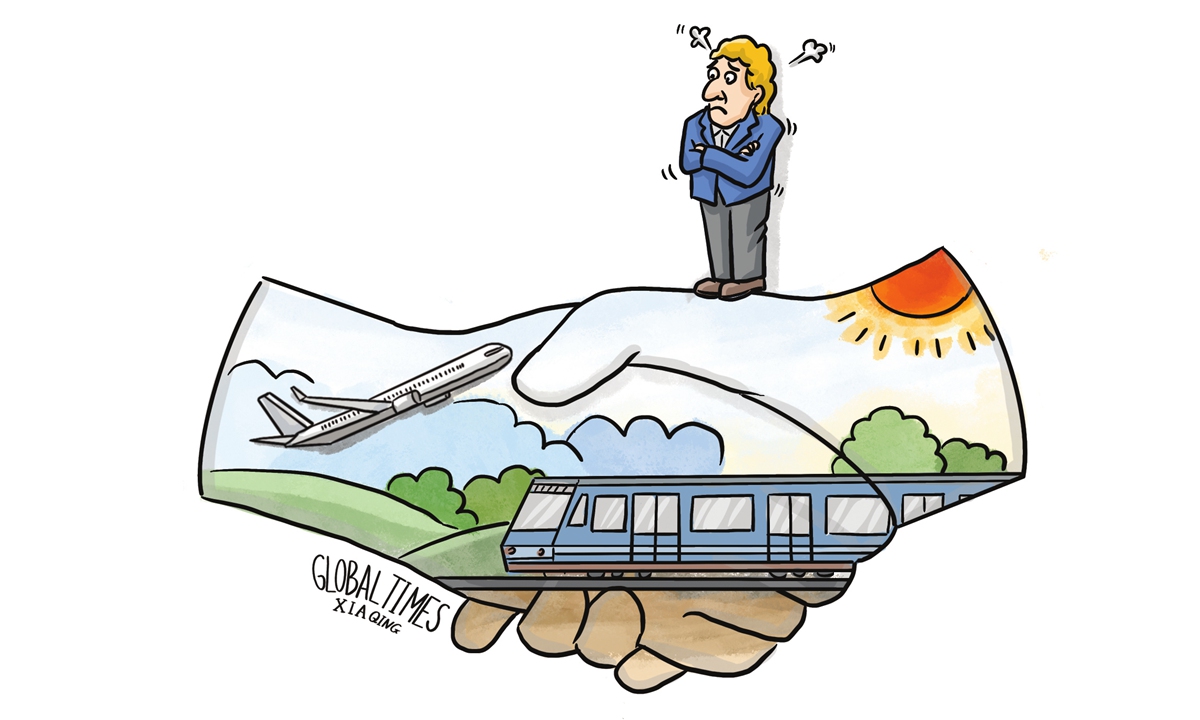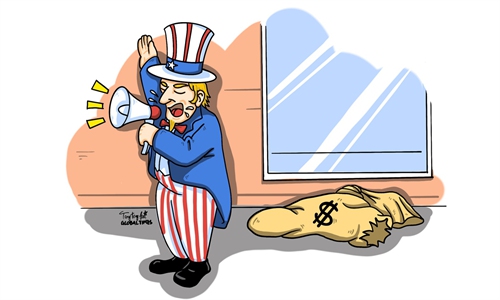COMMENTS / EXPERT ASSESSMENT
Blinken, visiting Africa, hides his true plan to vilify Belt and Road

Illustration: Xia Qing/GT
At the last stop of his three-nation trip to Africa, US Secretary of State Antony Blinken claimed on Saturday that there will be a fresh investment in Senegal without "saddling countries with unmanageable debts." Though Blinken didn't directly point his finger at China, US media said his debt talk is clearly aimed at China-proposed Belt and Road Initiative (BRI).
Comparing with his predecessor Mike Pompeo's reckless anti-China posturing, Blinken is taking a cautious approach vilifying China's programs. During his trip to Africa, Blinken avoided explicitly attacking China, and hid its arrogant attitude towards Africa, by demanding African countries pick sides between China and the US.
Blinken's cautious approach is the product of necessity. During his trip to Africa, Blinken clearly felt that African countries have gained tangible benefits from China's economic cooperation under the BRI framework. He knows well that continuing a blatant anti-China strategy of the previous American government will only backfire.
Leading officials from African countries have repeatedly refuted the US' unfounded accusations and Western media's hype about a so-called "debt trap" caused by BRI. During a joint press meeting with Blinken last week, Nigerian Foreign Minister Geoffrey Onyeama said that "in reality, our debt-to-GDP ratio is actually very good. So it's a sustainable debt".
However, no matter how sophisticated diplomatic rhetoric is designed, Blinken's true calculation for his Africa trip could not be concealed: driving a wedge into China-African cooperation and attempting to regain the US' lost influence in the African continent.
The eighth Ministerial Conference of the Forum on China-Africa Cooperation (FOCAC) will be held as scheduled at the end of November. Before the meeting is to be held, Blinken intentionally landed in Africa for a visit to shortcut China's influence there.
After decades of development, China and Africa have established mutually beneficial economic and trade relations. Since 2000, the China-Africa trade volume and China's investment in Africa have grown 20-fold and 100-fold, respectively. Yet, this type of mutually beneficial cooperation has become the target of attacks by the US and some of its allies. If Blinken aspired to disrupt China-Africa economic and trade relations through this visit, he is set to be disappointed.
Another major goal of Blinken's Africa tour is to set the stage for the second US-Africa Leaders Summit next year and to seek to rebuild the US' diplomatic influence there. In order to achieve the goal, Blinken did take some concrete measures this time, such as promising investment. The US diplomat on Saturday witnessed the signing of contracts worth more than $1 billion in Senegal.
Although Blinken adjusted approach towards African countries, and was keen to discuss cooperation projects, the reality is that the US is still facing major obstacles in promoting economic cooperation with Africa.
Though Blinken said the US would no longer treat African countries as "pawns" in a global game, he was still pushing values-oriented diplomacy during his tour. When kicking off his visit to Africa by first arriving in Kenya, he came with an appeal for the "preservation of democracy."
Actually, the people of African countries know quite well whether the US has come to play the game of competition among great powers, or is it truly promoting mutual beneficial economic ties.
And, when the US pitches an economic initiative, it always uses language and spin to persuade partner countries, but it always falls short when it comes to actual investment. Struggling to tame inflation and tackle other economic problems at home, the US currently doesn't have enough strength to promote economic cooperation with Africa countries. Although their statements sounds very appealing, African countries remain largely skeptical as to whether they can be implemented in real life.
The author is director of the institute of developing countries at the China Institute of International Studies in Beijing. bizopinion@globaltimes.com.cn



